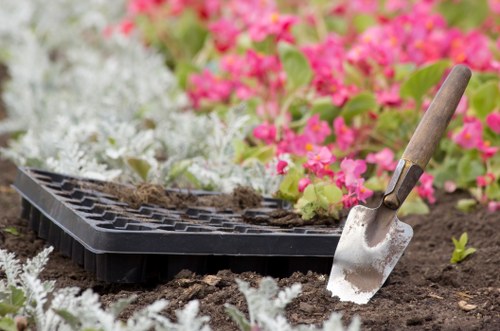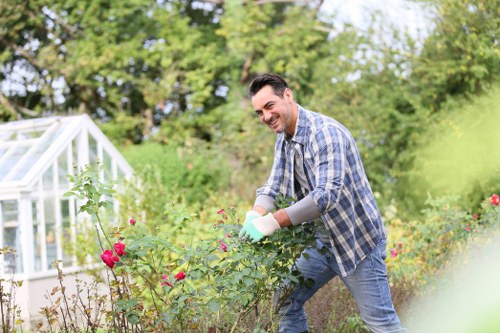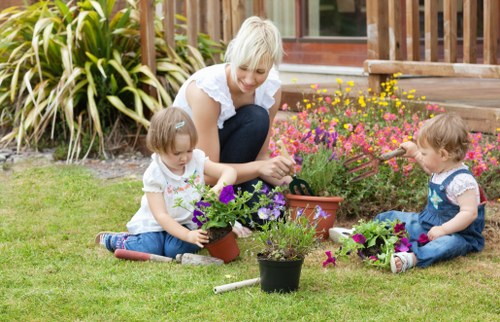Comprehensive Guide to Garden Maintenance in Covent Garden
Introduction to Garden Maintenance

Maintaining a beautiful garden in Covent Garden requires dedication, knowledge, and the right tools. Whether you’re a seasoned gardener or a beginner, understanding the nuances of garden upkeep in this bustling area can transform your outdoor space into a serene oasis.
Covent Garden offers a unique blend of urban energy and green spaces, making garden maintenance both a challenge and a rewarding endeavor. From selecting the right plants to regular upkeep, every aspect plays a crucial role in the health and aesthetics of your garden.
In this article, we will explore various strategies and tips to help you maintain a thriving garden in Covent Garden. We’ll cover essential maintenance tasks, seasonal care, plant selection, and much more to ensure your garden remains vibrant all year round.
Essential Garden Maintenance Tasks

Regular Weeding
One of the most important tasks in garden maintenance is weeding. Weeds compete with your plants for nutrients, water, and sunlight, which can stunt their growth. Regularly removing weeds ensures that your plants have the best chance to thrive.
How to Effectively Weed Your Garden
- Hand-pulling weeds to avoid disturbing the soil.
- Using mulch to suppress weed growth.
- Applying organic weed killers as a natural alternative.
Pruning and Trimming
Pruning is essential for maintaining the shape and health of your plants. It helps to remove dead or diseased branches, promotes better air circulation, and encourages new growth.
Best Practices for Pruning
- Use sharp, clean tools to make precise cuts.
- Prune in the early morning or late afternoon to reduce stress on the plants.
- Avoid over-pruning, which can damage the plant.
Irrigation Management
Proper irrigation is crucial, especially in an urban setting like Covent Garden where water drainage can be an issue. Ensuring your plants receive adequate water without overwatering is key to preventing root rot and other water-related problems.
Seasonal Garden Care

Spring Maintenance
Spring is a time of renewal and growth. Begin by cleaning up any debris from the winter months and preparing your soil for new plantings.
Tasks to Undertake
- Mulching to retain moisture and suppress weeds.
- Planting new flowers and vegetables.
- Fertilizing to provide necessary nutrients.
Summer Upkeep
During summer, focus on maintaining moisture levels and protecting plants from excessive heat.
Effective Summer Strategies
- Implementing drip irrigation systems.
- Using shade cloths to protect sensitive plants.
- Regularly checking for pests and diseases.
Autumn Preparation
As temperatures drop, it’s important to prepare your garden for the colder months.
Autumn Tasks
- Clearing fallen leaves to prevent mold growth.
- Planting perennials that thrive in cooler weather.
- Protecting delicate plants with appropriate coverings.
Choosing the Right Plants for Covent Garden

Selecting plants that are well-suited to Covent Garden’s climate and soil conditions can significantly reduce maintenance efforts and enhance garden beauty.
Climate Considerations
Covent Garden experiences a temperate climate with distinct seasons. Choose plants that can withstand temperature fluctuations and varying rainfall patterns.
Recommended Plants
- Perennials like Lavender and Hostas.
- Seasonal flowers such as Tulips in spring and Dahlias in summer.
- Vegetables like tomatoes and herbs that thrive in urban gardens.
Soil Health
Healthy soil is the foundation of a thriving garden. Regularly testing soil pH and nutrient levels can help you provide the best environment for your plants.
Improving Soil Quality
- Adding compost to enrich the soil.
- Using organic fertilizers to provide essential nutrients.
- Implementing crop rotation to prevent soil depletion.
Pest and Disease Management

Protecting your garden from pests and diseases is vital for maintaining plant health. Integrated Pest Management (IPM) strategies can help minimize damage while being environmentally friendly.
Identifying Common Pests
In Covent Garden, common garden pests include aphids, slugs, and caterpillars. Regular monitoring allows for early detection and management.
Natural Pest Control Methods
- Encouraging beneficial insects like ladybugs.
- Using organic pesticides such as neem oil.
- Implementing physical barriers like netting.
Preventing Plant Diseases
Proper sanitation and plant care can prevent many diseases. Avoiding overhead watering and ensuring good air circulation are key practices.
Effective Disease Prevention
- Removing and disposing of infected plant material.
- Applying fungicides when necessary.
- Selecting disease-resistant plant varieties.
Tools and Equipment for Garden Maintenance
Essential Gardening Tools
Having the right tools can make garden maintenance tasks easier and more efficient. Invest in quality tools to ensure longevity and effectiveness.
Must-Have Tools
- Pruning shears for accurate trimming.
- Garden gloves to protect your hands.
- Spades and trowels for soil preparation.
Advanced Equipment
For larger gardens or more intensive maintenance, consider investing in advanced equipment such as:
- Rotary tillers for soil aeration.
- Hedge trimmers for maintaining plant shapes.
- Automated irrigation systems for consistent watering.
Maintaining Your Tools
Regular maintenance of your gardening tools ensures they remain in good working condition and last longer.
Care Tips
- Clean tools after each use to prevent rust.
- Sharpen blades regularly for effective cutting.
- Store tools in a dry, sheltered place.
DIY vs. Professional Garden Maintenance
Pros and Cons of DIY Maintenance
Taking on garden maintenance yourself can be rewarding and cost-effective. However, it requires time, effort, and a certain level of expertise.
Advantages
- Personal satisfaction and connection to your garden.
- Cost savings compared to hiring professionals.
- Flexibility in scheduling and methods.
Disadvantages
- Time-consuming, especially for larger gardens.
- Requires knowledge and experience.
- Potential for mistakes that could harm plants.
When to Hire a Professional
Hiring a garden maintenance service in Covent Garden can be beneficial for those who lack the time or expertise to maintain their gardens effectively.
Benefits of Professional Services
- Expert knowledge and experience.
- Access to specialized tools and equipment.
- Consistent and reliable maintenance schedules.
Hybrid Approach
A hybrid approach, where you handle some tasks and outsource others, can provide the best of both worlds.
Implementing a Hybrid Strategy
- DIY for routine tasks like weeding and watering.
- Hire professionals for complex tasks like pruning large trees.
- Consult with experts for seasonal planting and design.
Enhancing Your Garden’s Aesthetics
Landscape Design Principles
Applying fundamental landscape design principles can greatly enhance the beauty and functionality of your garden.
Key Principles
- Balance: Distribute visual weight evenly.
- Contrast: Use differing colors and textures.
- Unity: Create a harmonious overall look.
Incorporating Hardscaping Elements
Hardscaping elements like pathways, patios, and garden structures add structure and interest to your garden.
Popular Hardscaping Features
- Stone walkways for a natural look.
- Wooden pergolas for shaded areas.
- Decorative fences for added security and style.
Adding Water Features
Water features such as fountains, ponds, or birdbaths can create a tranquil atmosphere and attract wildlife to your garden.
Benefits of Water Features
- Enhance the sensory experience with soothing sounds.
- Provide a habitat for beneficial insects and birds.
- Act as a focal point in garden design.
Sustainable Garden Practices
Organic Gardening
Organic gardening emphasizes the use of natural methods to maintain soil health and plant vitality without synthetic chemicals.
Organic Techniques
- Using compost and manure to enrich soil.
- Implementing crop rotation to prevent pest buildup.
- Encouraging biodiversity to enhance ecosystem resilience.
Water Conservation
In an urban area like Covent Garden, conserving water is essential. Implementing efficient watering systems and mindful practices can significantly reduce water usage.
Water-Saving Methods
- Installing rain barrels to collect and reuse rainwater.
- Using drought-resistant plants that require less water.
- Applying mulch to reduce evaporation and retain moisture.
Composting
Composting transforms kitchen and garden waste into valuable fertilizer, enhancing soil fertility and reducing landfill waste.
Starting a Compost Bin
- Choose a suitable location with good drainage.
- Add a balanced mix of green and brown materials.
- Regularly turn the compost to promote decomposition.
Common Challenges in Covent Garden Gardens
Urban Pollution
Urban pollution can affect plant health by introducing contaminants into the soil and air. Choosing resilient plants and implementing protective measures can mitigate these effects.
Protective Strategies
- Using raised beds with clean soil.
- Planting air-purifying species like ferns and ivy.
- Installing barriers to reduce pollutant exposure.
Limited Space
Many gardens in Covent Garden are compact. Maximizing space through vertical gardening and multi-functional plantings can enhance productivity and aesthetics.
Space-Saving Techniques
- Utilizing trellises for climbing plants.
- Incorporating container gardening.
- Choosing compact or dwarf plant varieties.
Soil Contamination
Historical urban areas like Covent Garden may have soil contamination issues. Testing and amending soil is crucial for safe and healthy gardening.
Addressing Soil Contamination
- Conducting soil tests for contaminants.
- Using raised beds with clean soil.
- Incorporating soil amendments to bind or reduce contaminants.
Cost-Effective Garden Maintenance Tips
Budget-Friendly Practices
Maintaining a garden doesn’t have to be expensive. Implementing cost-effective strategies can help you achieve a beautiful garden without breaking the bank.
Tips for Saving Money
- Start composting to reduce fertilizer costs.
- Propagate plants from cuttings or seeds.
- Reuse materials for garden projects, such as repurposing old containers.
Time Management
Efficiently managing your time can reduce the overall cost of garden maintenance by streamlining tasks and minimizing wasted effort.
Effective Time-Saving Methods
- Creating a maintenance schedule to stay organized.
- Grouping similar tasks together for efficiency.
- Investing in tools that save time, such as mulchers or automated watering systems.
DIY Solutions
Embracing DIY solutions can not only save money but also provide a sense of accomplishment and personalization to your garden.
DIY Projects
- Building your own raised garden beds.
- Creating custom planters from recycled materials.
- Making natural pest repellents using household ingredients.
Enhancing Garden Sustainability
Native Plant Integration
Incorporating native plants into your garden supports local ecosystems and reduces maintenance needs, as these plants are well-adapted to the regional climate and soil conditions.
Benefits of Native Plants
- Require less water and fertilizers.
- Provide habitat for local wildlife.
- Resist local pests and diseases naturally.
Renewable Resources
Using renewable resources in your garden promotes sustainability and reduces environmental impact. This includes tools, materials, and practices that are eco-friendly.
Implementing Renewable Practices
- Using solar-powered garden lights.
- Choosing sustainably sourced materials for garden structures.
- Incorporating rainwater harvesting systems.
Energy-Efficient Gardening
Energy-efficient gardening practices minimize resource usage and contribute to a healthier environment.
Energy-Saving Tips
- Utilize manual tools to reduce electricity consumption.
- Opt for native and drought-resistant plants to decrease watering needs.
- Implement composting to recycle organic waste.
Conclusion and Next Steps
Maintaining a Vibrant Garden
Effective garden maintenance in Covent Garden involves a combination of regular upkeep, strategic planning, and sustainable practices. By following the tips and strategies outlined in this article, you can cultivate a garden that is both beautiful and resilient.
Final Thoughts
Whether you choose to maintain your garden yourself or enlist the help of professionals, the key is consistency and care. A well-maintained garden not only enhances your living space but also contributes positively to the environment.
Take Action Today
Ready to transform your Covent Garden garden? Contact us today to learn more about our garden maintenance services or book your service now and take the first step towards a thriving outdoor space.